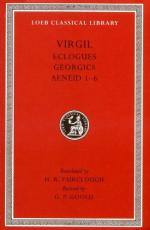|
This section contains 9,844 words (approx. 33 pages at 300 words per page) |

|
SOURCE: “A Version of Pastoral: Virgil, Eclogue 4” in Quality and Pleasure in Latin Poetry, edited by Tony Woodman and David West, Cambridge University Press, 1974, pp. 31-47.
In the essay below, Williams offers a line-by-line analysis of Eclogue 4, contending that the poem's meaning is linked to its historical significance: it is concerned primarily with the establishment of peace in the Roman world, the end of civil war, and the onset of a new era.
Sicelides Musae, paulo maiora canamus: non omnis arbusta iuuant humilesque myricae— si canimus siluas, siluae sint consule dignae.
Vltima Cumaei uenit iam carminis aetas: magnus ab integro saeclorum nascitur ordo. iam redit et uirgo, redeunt Saturnia regna: iam noua progenies caelo demittitur alto. tu modo nascenti puero, quo ferrea primum desinet ac toto surget gens aurea mundo, casta faue Lucina: tuus iam regnat Apollo.
(teque adeo decus hoc aeui, te consule, inibit, Pollio, et incipient...
|
This section contains 9,844 words (approx. 33 pages at 300 words per page) |

|


